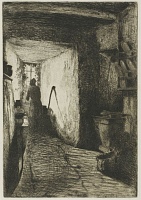The Kitchen | ||
| Number: | 16 | |
| Date: | 1858 | |
| Medium: | etching | |
| Size: | 227 x 157 mm | |
| Signed: | 'Whistler' at lower right | |
| Inscribed: | 'Imp. Delatre. Rue St. Jacques. 171.' at lower right (2); partly removed (3) | |
| Set/Publication: | 'French Set', 1858; Fine Art Society, 1885 (3) | |
| No. of States: | 3 | |
| Known impressions: | 67 | |
| Catalogues: | K.24; M.24; T.13; W.19 | |
| Impressions taken from this plate (67) | ||
PUBLICATION
13: Whistler to Huish, [17 June 1884?], GUW #01172.
14: The Academy, 7 August 1886, p. 95.
EXHIBITIONS
15: Hague 1863. See REFERENCES: EXHIBITIONS.
16: 'Mr Whistler's Etchings', The Builder, 5 July 1874 (in GUL PC1/73).
17: London Pall Mall 1874 (cat. no. 26).
18: Liverpool 1874 (cat. no. 513).
 ). 19 Impressions were seen by the public in several international exhibitions, including the Glasgow International Exhibitions of 1888, lent by Bernard Buchanan MacGeorge (1845?-1924), and 1901, lent by James Cox-Cox (ca 1849- d.1901). 20 Impressions were lent by Mansfield to an exhibition of etchings at the Art Institute of Chicago in 1891 (i.e.
). 19 Impressions were seen by the public in several international exhibitions, including the Glasgow International Exhibitions of 1888, lent by Bernard Buchanan MacGeorge (1845?-1924), and 1901, lent by James Cox-Cox (ca 1849- d.1901). 20 Impressions were lent by Mansfield to an exhibition of etchings at the Art Institute of Chicago in 1891 (i.e.  ), and it was included in the panel organised by Howard Mansfield (1849-1938) at the World's Columbian Exposition of 1893. 21 Another was lent by Bryan Lathrop (1844-1916) to the Caxton Club, Chicago, in 1900 (
), and it was included in the panel organised by Howard Mansfield (1849-1938) at the World's Columbian Exposition of 1893. 21 Another was lent by Bryan Lathrop (1844-1916) to the Caxton Club, Chicago, in 1900 ( ). 22
). 22 In New York, it was shown in print dealer's shows, by H. Wunderlich & Co. (1889, 1898, 1903) and F. Keppel & Co. (1902). Charles Lang Freer (1856-1919) bought impressions of the second (
 ) and third state (
) and third state ( ) from Wunderlich's show in 1898. 23
) from Wunderlich's show in 1898. 23 Finally, it was exhibited in the Memorial Exhibitions after Whistler's death, by the Copley Society in Boston and at the Grolier Club in New York in 1904, and in Paris and London in 1905, being lent by King Edward VII to the London show (
 ). 24
). 24 19: New York 1881 (cat. no. 30).
20: Glasgow 1888 (cat. no. 2552-7); Glasgow 1901 (cat. no. 240).
21: Mansfield to Whistler, 20 November 1891, GUW #03995.
22: Chicago 1900 (cat. no. 19).
23: New York 1898 (cat. no. 18).
24: Boston 1904 (cat. no. 14); New York 1904a (cat. nos. 20); London Mem. 1905 (cat. no. 19); Paris Mem. 1905 (cat. no. 300).
SALES & COLLECTORS
 ).
). ). 25
). 25 25: V&A, Register for Prints, p. 33.
 ), and certainly Haden owned impressions of the second (
), and certainly Haden owned impressions of the second ( ), and third state (
), and third state ( ) which were bought by Charles Lang Freer (1856-1919) from Wunderlich's in 1898. other early collectors included George Aloysius Lucas (1824-1909) (
) which were bought by Charles Lang Freer (1856-1919) from Wunderlich's in 1898. other early collectors included George Aloysius Lucas (1824-1909) ( ) and Samuel Putnam Avery (1822-1904) (
) and Samuel Putnam Avery (1822-1904) ( ). The British Museum acquired an impression in 1872 (
). The British Museum acquired an impression in 1872 ( ).
). In April 1876 the collection of Philippe Burty (1830-1890) was exhibited by Alphonse Wyatt Thibaudeau (ca 1840- d.1892) in the print-shop of Thomas M. McLean (b. ca 1832) in Haymarket, London, prior to its auction. Wedmore's review specifically mentions this etching:
26: 'Mr Whistler's Paintings', Baltimore Gazette, after 1 April 1876, in GUL PC1/75; quoting E.D. Wallace, 'The Fine Arts Abroad', Forney's Weekly Press, Philadelphia, 1 April 1876.
27: F. Wedmore, 'M. Burty's collection', The Academy , 29 April 1876, pp. 414-15.
28: Sotheby's, 22 April 1887 (lot 177); Sotheby’s, 3 March 1892 (lots 63-5); Christie’s, 8-9 March 1892 (lots 326-7).
 ). The prices Whistler himself obtained from Wunderlich's ranged from £6.6.0 on 4 July 1892 to £8.8.0 on 10 April 1893, for one impression plus a 'destroyed proof'. 29
). The prices Whistler himself obtained from Wunderlich's ranged from £6.6.0 on 4 July 1892 to £8.8.0 on 10 April 1893, for one impression plus a 'destroyed proof'. 29
